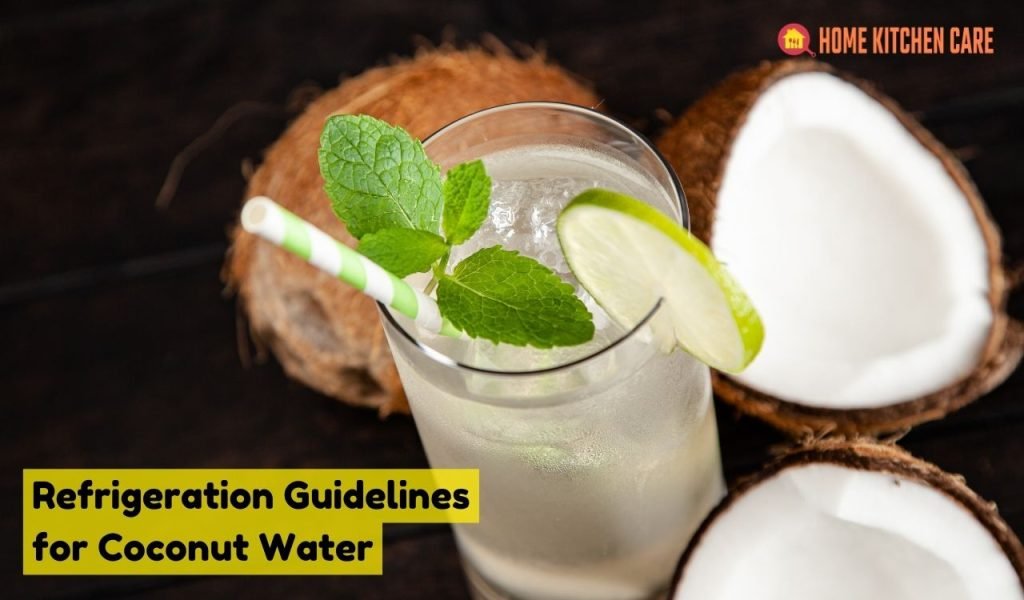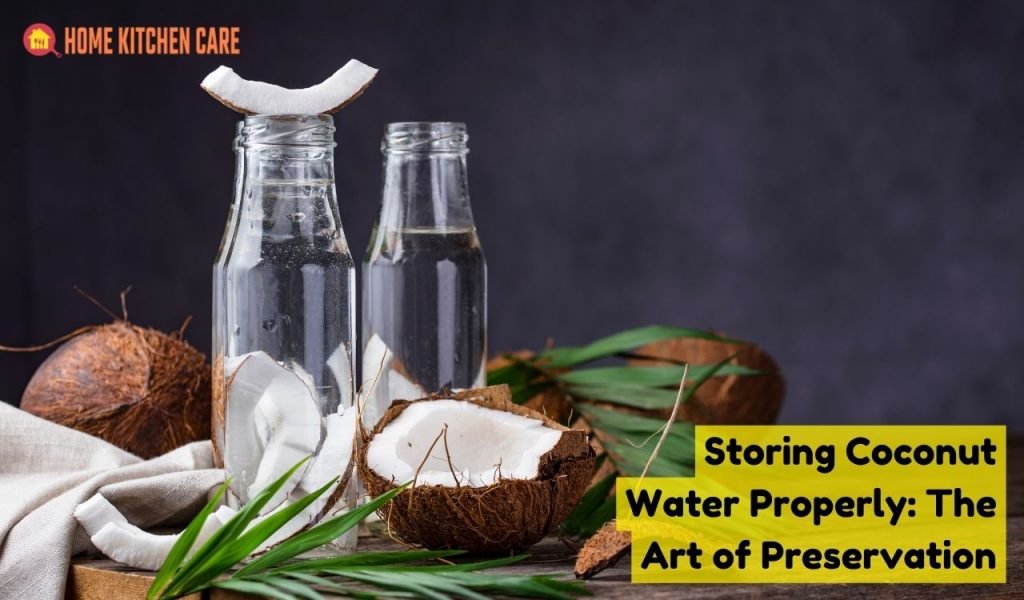Physical Address
304 North Cardinal St.
Dorchester Center, MA 02124
Physical Address
304 North Cardinal St.
Dorchester Center, MA 02124

Does coconut water need to be refrigerated? It’s a question that’s sparked curiosity among many coconut water enthusiasts. You’re not alone in wondering about the ideal storage for this natural thirst-quencher. Whether you’re a fitness aficionado or simply seeking a refreshing drink, understanding the ins and outs of coconut water storage can make a notable difference in your experience.
From room temperature debates to the aftermath of forgetting an open bottle in the fridge, we’re diving into the world of coconut water preservation. So, if you’ve ever pondered how to keep your coconut water at its best, you’re about to uncover some juicy insights. Let’s quench your thirst for knowledge!
Main Summary: Does Coconut Water Need to Be Refrigerated?
Coconut water needs refrigeration to prevent spoilage and maintain freshness. Unrefrigerated sugars invite microbes. After opening, store in the fridge for up to 5 days for optimal freshness, taste and nutrients.
Coconut water has surged in popularity as a refreshing and hydrating beverage. But do you find yourself pondering, “Does coconut water need to be refrigerated?” This question deserves a closer look. We’ll delve into the reasons why refrigeration matters for coconut water and explore the various factors influencing its refrigeration needs. So, let’s journey into the world of coconut water freshness!
Imagine yourself lounging under the swaying palm trees on a sun-soaked beach, sipping on a freshly cracked coconut. The first sip is pure refreshment – a symphony of sweetness and hydration. But what happens when you don’t finish it in one go? This is where refrigeration steps in as the guardian of flavor.
Coconut water, when left unrefrigerated, is susceptible to a swift transformation. The tropical haven of microorganisms sees an opportunity to turn your liquid paradise into a not-so-pleasant surprise. Bacteria and yeasts, drawn to warmth and moisture, may take root in your coconut water, causing it to ferment and altering its taste. Refrigeration acts as a potent inhibitor, putting the brakes on microbial growth and maintaining that fresh, delectable taste.
Now that we’ve established the why, let’s delve into the what and when. A multitude of factors play a role in determining whether your coconut water needs a chill session:
In a world where we’re often on the go, it’s not uncommon to wonder about the fate of an unfinished coconut water bottle. So, the next time you find yourself asking, “Does coconut water need to be refrigerated?” remember that while refrigeration is highly recommended, the factors mentioned above can influence the urgency.
In the end, it’s all about savoring the coconut water experience. Picture this: you’re on a hike, the sun warming your skin, and you take a sip of perfectly chilled coconut water. It’s crisp, rejuvenating, and free from the tang of fermentation. By understanding why refrigeration matters and the factors influencing its need, you’re equipped to make the most of your coconut water moments.
So, whether you’re basking on a sandy shore or tackling your daily routine, remember the golden rule: once that coconut water is cracked open, give it a cozy spot in the fridge to ensure every sip remains a tropical delight.

Imagine this scenario: a sunny afternoon, beads of sweat forming on your brow, and in your hand, a bottle of revitalizing coconut water. The allure of immediate gratification tugs at you, urging you to quench your thirst with a single gulp. But here’s the twist: the magic of coconut water lies in the crispness of its flavor and the refreshment it offers when it’s adequately chilled.
Coconut water, like a delicate dance of flavors, necessitates proper refrigeration to maintain its integrity. The refrigerator becomes a haven where it can hold onto its natural sweetness and composition. In a world where heat invites the rapid growth of microorganisms, exposing your coconut water to warmer temperatures can result in unwelcome changes.
So, what’s the golden rule? Once the seal is broken, the countdown begins. Unrefrigerated coconut water after opening starts a clock that counts down to diminishing quality. It’s akin to an orchestra losing its harmony; the initial symphony of flavors begins to sway off-key.
As you savor your coconut water, it’s crucial to acknowledge that refrigeration is the maestro ensuring the continuity of its symphonic taste. When you grant your coconut water the luxury of a chilled environment, you’re essentially extending an invitation to an encore performance of its tropical notes.
Now, let’s delve into the intricacies of coconut water storage. As the seal breaks and you indulge in the refreshing liquid, the preservation of freshness becomes paramount. This is where the cooling comfort of the refrigerator plays a pivotal role.
The consensus is clear: Opened coconut water demands refrigeration to maintain its crisp, sweet taste. The composition of coconut water makes it an inviting host for microorganisms. With warmth as their ally, these tiny invaders can alter the very essence of the drink you hold dear.
The refrigerator acts as a guardian, a sentinel warding off the encroachment of unwelcome guests. It creates an environment where microorganisms lose their vigor, preserving the natural sugars and electrolytes that characterize coconut water. The outcome? A symphony of flavors that continues to sing in harmony with your palate.
In the pursuit of quenching your thirst with the nectar of coconuts, remember that the choice to refrigerate is the choice to savor. By embracing the cool refuge of your refrigerator, you’re extending an invitation to a taste of paradise. Every chilled sip becomes a journey to that serene beach, where coconuts sway to nature’s rhythm.
As you raise your glass to your lips, consider the journey it has undertaken—from the tropical palms to your very hand. Choosing refrigeration is a testament to the commitment of preserving that journey, one sip at a time. The cooling embrace becomes a portal to the memories of beaches, sunshine, and the tropical escape you’ve always yearned for.
Envision this scenario: you’ve savored a portion of your coconut water, reveling in its pure, natural sweetness. Life takes you on a whirlwind, and the remaining liquid finds itself abandoned on the kitchen counter. Hours blend into days, and suddenly, it dawns on you—the coconut water! With a mixture of hope and apprehension, you take a hesitant sip, only to be met with an unexpected surprise.
Coconut water left unrefrigerated, post-opening, takes an unforeseen detour in flavor. While it doesn’t pose an immediate health threat, its taste profile might venture into uncharted territory. The vibrant notes you cherish might morph into subtle hints of fermentation. Your journey to a tropical haven takes an unexpected twist.
But why does this metamorphosis occur? Coconut water’s inherent sweetness and electrolyte content make it an appealing habitat for microorganisms, especially in warmer settings. Refrigeration emerges as the guardian, slowing their advancement and ensuring the sensory delight you seek remains unadulterated.

When it comes to coconut water, its pristine taste and delicate nutritional profile make proper storage essential. Whether you’re a fitness enthusiast or simply seeking a refreshing beverage, knowing how to store coconut water properly can ensure that you savor every sip in its optimal state.
Coconut water is a natural source of hydration, packed with electrolytes and nutrients that can provide a quick energy boost. However, this tropical elixir is also susceptible to changes in temperature and exposure to air. Here’s a guide to help you master the art of preserving coconut water’s freshness and flavor.
The primary rule for storing coconut water is refrigeration. Unopened containers can be stored at room temperature for a short period, but to maintain the best quality, it’s recommended to store them in the refrigerator. Once opened, promptly refrigerate the coconut water to prevent the growth of bacteria and to ensure that its taste remains as invigorating as ever.
When it comes to preserving the quality of your coconut water, sealing the container is paramount. After opening a can or bottle, reseal it tightly to minimize exposure to air. Oxygen can degrade the taste and nutritional content of the coconut water, so a secure seal helps maintain its integrity.
Coconut water, like any natural beverage, is sensitive to temperature changes. Keep your coconut water away from extreme heat or direct sunlight, as these factors can lead to deterioration and spoilage. Storing it in a cool, shaded place is crucial, even before opening the container.
Before consuming coconut water, take a quick visual and olfactory assessment. If the liquid appears cloudy or has an off-putting odor, it’s best to discard it. These are signs that the coconut water might have gone bad.
Opt for transparent containers when buying coconut water. This allows you to inspect the liquid’s clarity and spot any changes more easily. Murky or discolored coconut water could indicate spoilage.
If you’re aiming for long-term storage, consider freezing coconut water. Pour the liquid into ice cube trays and freeze it. These coconut water ice cubes can be added to smoothies or used to chill your beverages without diluting them.
Coconut water is best enjoyed when it’s fresh. It’s advisable not to buy more coconut water than you can consume within a reasonable time frame. This way, you’ll always have a supply of refreshing, perfectly preserved hydration at your fingertips
In your quest to indulge in nature’s hydration marvel, remember that the refrigerator is your ally. Within its cool embrace lies the secret to unlocking a sip of paradise with every gulp. With each chilled drop, you’re transported to sandy beaches, swaying palms, and the sensory wonders of the tropics. As you lift your glass, raise a toast to the journey of your coconut water, from palm-fringed groves to your hands.
Choosing refrigeration is a testament to your commitment to preserving that journey, sip by sip. Amid the hustle of modern life, let your coconut water find respite within the refrigerator—a tribute to the care bestowed upon this elixir of refreshment, preserving its taste, and relishing its authentic essence.
Coconut water is best refrigerated to maintain its freshness and prevent fermentation. While unopened containers can be stored at room temperature for a short period, refrigeration is recommended for extended shelf life and optimal taste.
After opening, transfer the coconut water to an airtight container or reseal the original packaging tightly. Place it in the refrigerator at or below 40°F (4°C) to inhibit bacterial growth and preserve its taste.
Unopened coconut water can last for several months at room temperature. However, it’s advisable to refrigerate it to extend its shelf life and maintain its quality.
Once opened, refrigerate coconut water promptly. It’s best to consume opened coconut water within 24 to 48 hours for the freshest taste and to prevent any potential spoilage.
Coconut water left unrefrigerated can eventually go bad. Bacteria and yeasts may cause fermentation, altering its taste. To ensure its freshness and taste, it’s recommended to refrigerate coconut water after opening.